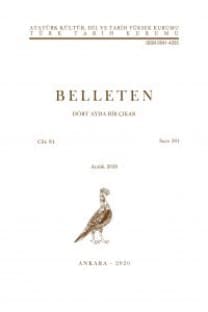Türk Tarih Kurumu ilk Bilim Kurulu Açış konuşması
Türk Tarih Kurumu'nun değerli aslî üyeleri, "Atatürk'ün emir ve isteği üzerine, yüksek koruyuculuğu altında kurulmuş olan Türk Tarih Kurumu, tüzel kişiliğe sahip, bilimsel hizmet ve faaliyette bulunacak bir kurum olarak ATATÜRK KÜLTÜR, DİL VE TARİH YÜKSEK KURUMU'nun kuruluşuna dahil edilmiş ve yeniden düzenlenmiş" niteliği ile 2876 numaralı özel kanunumuzda öngörülen görevlerini yerine getirmek üzere çalışmalarına başlıyor. Kurumumuzun aslî unsurları olan siz sayın üyeleri, saygı ve muhabbetle selâmlıyorum. Sizlerin varlığı, Kurumumuzun amaçlarına ulaşmasında başta gelen güvencedir. Çünkü sizler, "Kanunumuzda belirlenen amaç ve ilkeleri benimsediğini tutum ve davranışları, bilimsel eserleri, çalışma ve faaliyetleri veya eğitim ve öğretim hizmetleriyle kanıtlamış; idarî tecrübeye sahip adaylar arasından" seçilmiş bulunuyorsunuz. Sizlerin kişiliğinize duyulan güven, taşıdığınız sorumluluk duygusu, çalışma azmi, yüce kurulumuzun en belirgin özelliğini oluşturuyor. Böylesine yüksek nitelikleri taşıyan mesaî arkadaşlarımın varlığı ile gurur duyuyor ve sizlerle çalışma fırsatına sahip olmayı, hayatımın en dikkate değer şansı sayıyorum. Bu vesileyle hepinizi tek tek bir kez daha tebrik eder, başarılarınızın sürekli olmasını dilerim.
Anahtar Kelimeler:
Atatürk Kültür, Dil ve Tarih Yüksek Kurumu, Türk Tarih Kurumu, Bilim Kurulu, Mustafa Kemal Atatürk
A Review of Portuguese and Turkish Sources for the Ottomans in Arabia and the Indian Ocean in the 16th Century
In the beginning of the sixteenth century the Indian Ocean witnessed the course of events which greatly effected the economies of the Mediterranean as well as the Ottoman and Arab countries. The Portuguese reached the Western India at the end of the fifteenth century and established themselves at various strategic points around the Indian Ocean, seeking to dominate and shift the flow of trade which had been running through the Red Sea and the Gulf to the Mediterranean world for many centuries. On the other hand, the Ottomans became a sea power as well as the land after the conquest of Constantinople; and conquered Egypt in 1517 taking control of the Red Sea. Towards the middle of the sixteenth century, in the time of Suleyman the Magnificent, they took Baghdad and made a direct contact with the Gulf, thus establishing themselves at various important points around the Arabian Peninsula. So became the two empires, Catolic Portuguese and Sunni Ottoman, vis-a-vis, in the waters of the Indian Ocean, drawing themselves far from their capitals.
Keywords:
Portuguese Turkish, Ottoman Empire, Arabian Peninsula, Indian Ocean, 16th Century,
- ISSN: 0041-4255
- Yayın Aralığı: Yılda 3 Sayı
- Başlangıç: 1937
- Yayıncı: Türk Tarih Kurumu
Sayıdaki Diğer Makaleler
Three More Duplicates to Astrolabe b
Urartuluların Kökeni ve Dilleri
Garîb-Nâme'de Alplık Geleneğiyle İlgili Bilgiler
Türk Tarih Kurumu ilk Bilim Kurulu Açış konuşması
Kurtuluş Savaşında Demiryolculuk IV
Bizans İmparatorluğu'nun Çöküşündeki Ekonomik Faktörler
Tarih Objektifinde Hz. Peygamberin Hadisleri ve Türkler
Haçlılara Karşı Mücadelede Başarılı Bir Türk Kumandanı : Savar
